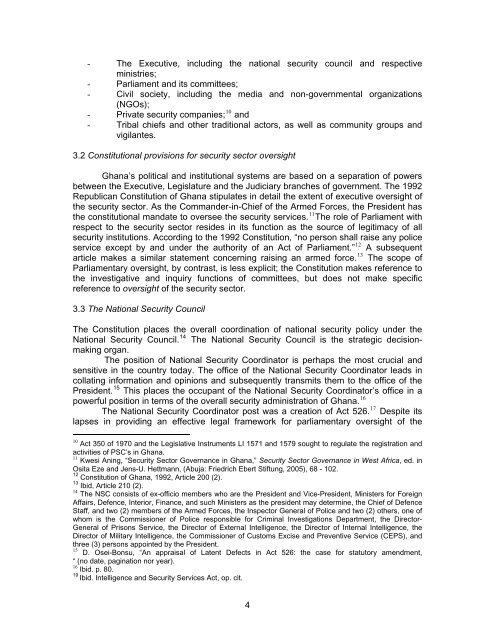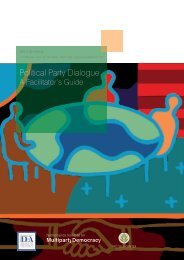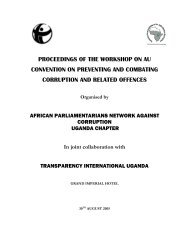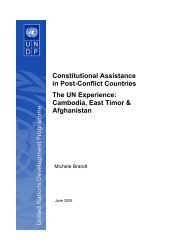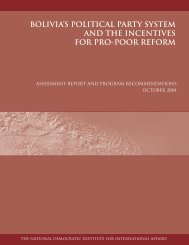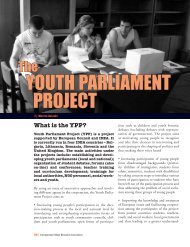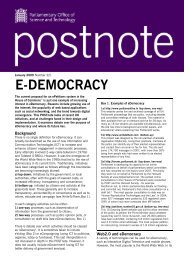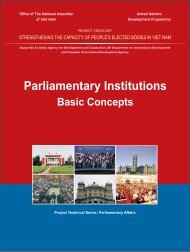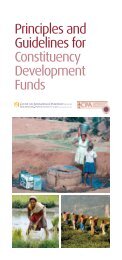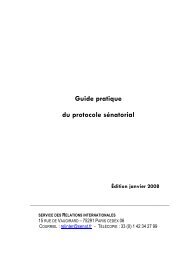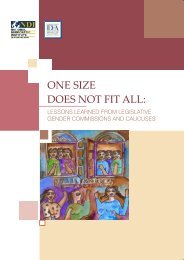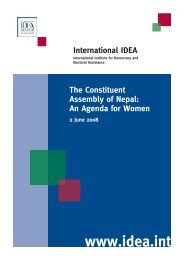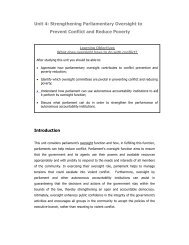- The Executive, including <strong>the</strong> national security council and respectiveministries;- Parliament and its committees;- Civil society, including <strong>the</strong> media and non-governmental organizations(NGOs);- Private security companies; 10 and- Tribal chiefs and o<strong>the</strong>r traditional actors, as well as community groups andvigilantes.3.2 Constitutional provisions for security sector oversight<strong>Ghana</strong>’s political and institutional systems are based on a separation <strong>of</strong> powersbetween <strong>the</strong> Executive, Legislature and <strong>the</strong> Judiciary branches <strong>of</strong> government. The 1992Republican Constitution <strong>of</strong> <strong>Ghana</strong> stipulates in detail <strong>the</strong> extent <strong>of</strong> executive oversight <strong>of</strong><strong>the</strong> security sector. As <strong>the</strong> Commander-in-Chief <strong>of</strong> <strong>the</strong> Armed Forces, <strong>the</strong> President has<strong>the</strong> constitutional mandate to oversee <strong>the</strong> security services. 11 The role <strong>of</strong> Parliament withrespect to <strong>the</strong> security sector resides in its function as <strong>the</strong> source <strong>of</strong> legitimacy <strong>of</strong> allsecurity institutions. According to <strong>the</strong> 1992 Constitution, “no person shall raise any policeservice except by and under <strong>the</strong> authority <strong>of</strong> an Act <strong>of</strong> Parliament.” 12 A subsequentarticle makes a similar statement concerning raising an armed force. 13 The scope <strong>of</strong><strong>Parliamentary</strong> oversight, by contrast, is less explicit; <strong>the</strong> Constitution makes reference to<strong>the</strong> investigative and inquiry functions <strong>of</strong> committees, but does not make specificreference to oversight <strong>of</strong> <strong>the</strong> security sector.3.3 The National <strong>Security</strong> CouncilThe Constitution places <strong>the</strong> overall coordination <strong>of</strong> national security policy under <strong>the</strong>National <strong>Security</strong> Council. 14 The National <strong>Security</strong> Council is <strong>the</strong> strategic decisionmakingorgan.The position <strong>of</strong> National <strong>Security</strong> Coordinator is perhaps <strong>the</strong> most crucial andsensitive in <strong>the</strong> country today. The <strong>of</strong>fice <strong>of</strong> <strong>the</strong> National <strong>Security</strong> Coordinator leads incollating information and opinions and subsequently transmits <strong>the</strong>m to <strong>the</strong> <strong>of</strong>fice <strong>of</strong> <strong>the</strong>President. 15 This places <strong>the</strong> occupant <strong>of</strong> <strong>the</strong> National <strong>Security</strong> Coordinator’s <strong>of</strong>fice in apowerful position in terms <strong>of</strong> <strong>the</strong> overall security administration <strong>of</strong> <strong>Ghana</strong>. 16The National <strong>Security</strong> Coordinator post was a creation <strong>of</strong> Act 526. 17 Despite itslapses in providing an effective legal framework for parliamentary oversight <strong>of</strong> <strong>the</strong>10 Act 350 <strong>of</strong> 1970 and <strong>the</strong> Legislative Instruments LI 1571 and 1579 sought to regulate <strong>the</strong> registration andactivities <strong>of</strong> PSC’s in <strong>Ghana</strong>.11 Kwesi Aning, “<strong>Security</strong> <strong>Sector</strong> Governance in <strong>Ghana</strong>,” <strong>Security</strong> <strong>Sector</strong> Governance in West Africa, ed. inOsita Eze and Jens-U. Hettmann, (Abuja: Friedrich Ebert Stiftung, 2005), 68 - 102.12 Constitution <strong>of</strong> <strong>Ghana</strong>, 1992, Article 200 (2).13 Ibid, Article 210 (2).14 The NSC consists <strong>of</strong> ex-<strong>of</strong>ficio members who are <strong>the</strong> President and Vice-President, Ministers for ForeignAffairs, Defence, Interior, Finance, and such Ministers as <strong>the</strong> president may determine, <strong>the</strong> Chief <strong>of</strong> DefenceStaff, and two (2) members <strong>of</strong> <strong>the</strong> Armed Forces, <strong>the</strong> Inspector General <strong>of</strong> Police and two (2) o<strong>the</strong>rs, one <strong>of</strong>whom is <strong>the</strong> Commissioner <strong>of</strong> Police responsible for Criminal Investigations Department, <strong>the</strong> Director-General <strong>of</strong> Prisons Service, <strong>the</strong> Director <strong>of</strong> External Intelligence, <strong>the</strong> Director <strong>of</strong> Internal Intelligence, <strong>the</strong>Director <strong>of</strong> Military Intelligence, <strong>the</strong> Commissioner <strong>of</strong> Customs Excise and Preventive Service (CEPS), andthree (3) persons appointed by <strong>the</strong> President.15D. Osei-Bonsu, “An appraisal <strong>of</strong> Latent Defects in Act 526: <strong>the</strong> case for statutory amendment,“ (no date, pagination nor year).16 Ibid. p. 80.19Ibid. Intelligence and <strong>Security</strong> Services Act, op. cit.4
security sector in <strong>Ghana</strong>, Act 526 marks <strong>the</strong> first time that a national security lawprescribed <strong>the</strong> national security architecture for <strong>the</strong> state in depth. However, <strong>the</strong> entirePart 1 <strong>of</strong> Act 526 was lifted <strong>from</strong> <strong>the</strong> 1992 Constitution, 18 which excludes <strong>the</strong> National<strong>Security</strong> Coordinator (as well as <strong>the</strong> heads <strong>of</strong> <strong>the</strong> <strong>Ghana</strong> Immigration Service and <strong>the</strong>National Fire Service) as ex-<strong>of</strong>ficio members <strong>of</strong> <strong>the</strong> National <strong>Security</strong> Council. Prior to1996, <strong>the</strong> Cabinet Secretary was assigned <strong>the</strong> role <strong>of</strong> Secretary <strong>of</strong> <strong>the</strong> National <strong>Security</strong>Council. However, with <strong>the</strong> creation <strong>of</strong> <strong>the</strong> National <strong>Security</strong> Coordinator’s <strong>of</strong>fice, <strong>the</strong>continued secondment <strong>of</strong> <strong>the</strong> Cabinet Secretary to <strong>the</strong> National <strong>Security</strong> Council appearsto be misplaced.The exclusion <strong>of</strong> <strong>the</strong> National <strong>Security</strong> Coordinator has <strong>of</strong>ten raised misgivings,notwithstanding that <strong>the</strong> situation is partially remedied through Presidential appointment.Inclusion <strong>of</strong> <strong>the</strong> National <strong>Security</strong> Coordinator would have required amending Article 83<strong>of</strong> <strong>the</strong> Constitution, but as <strong>the</strong> provisions <strong>of</strong> Article 83 are “entrenched,” 19 <strong>the</strong>y can onlybe amended after a referendum has taken place. Parliament could also decide to invokeits residual powers to enact certain amendments to Article 83 <strong>of</strong> <strong>the</strong> Constitution. 20 In2006, <strong>the</strong> appointment <strong>of</strong> a substantive Minister for National <strong>Security</strong>, who also servedas <strong>the</strong> National <strong>Security</strong> Coordinator, heightened <strong>the</strong> debate over <strong>the</strong> mandate andpowers <strong>of</strong> <strong>the</strong> minister within <strong>the</strong> national security architecture. There is <strong>the</strong> need to haveclarity on <strong>the</strong> role and mandate <strong>of</strong> <strong>the</strong> Minister for National <strong>Security</strong>. 213.4 Regional and District <strong>Security</strong> CouncilsBelow <strong>the</strong> National <strong>Security</strong> Council are <strong>the</strong> Regional and District <strong>Security</strong> Councils 22 –REGSEC and DISEC, respectively – established under Act 526. 23 These organs are incharge <strong>of</strong> implementing government security policy pertaining to <strong>the</strong> regional and districtlevels. Specifically, <strong>the</strong> role <strong>of</strong> <strong>the</strong> Regional and District <strong>Security</strong> Councils are to:i. Provide early warning to Government <strong>of</strong> <strong>the</strong> existence or likelihood <strong>of</strong> anysecurity threat to <strong>the</strong> region, or <strong>the</strong> country or to <strong>the</strong> Government; andii.Perform such functions <strong>of</strong> <strong>the</strong> National <strong>Security</strong> Council as <strong>the</strong> Council mayassign to it. 24There are regular reporting systems through which situation reports and memos<strong>from</strong> <strong>the</strong> districts are sent up to <strong>the</strong> REGSEC and <strong>the</strong>n to National <strong>Security</strong> Council. 25Feedback and command systems also filter down to <strong>the</strong> DISEC through REGSEC <strong>from</strong>18 Part 3 Section 17 <strong>of</strong> Act 526 establishes <strong>the</strong> <strong>of</strong>fice <strong>of</strong> <strong>the</strong> National <strong>Security</strong> Coordinator.19 Constitution <strong>of</strong> <strong>Ghana</strong>, specifically Article 290 (1)f <strong>the</strong> whole provision <strong>of</strong> Chapter eight (8), 1992.20 Constitution <strong>of</strong> <strong>Ghana</strong>, 1992, Article 298.21 Osei–Bonsu, op. cit.22 The REGSEC consists <strong>of</strong> <strong>the</strong> Regional Minister and his Deputy, <strong>the</strong> Chief Executive <strong>of</strong> <strong>the</strong> MetropolitanAssembly, an Officer <strong>of</strong> <strong>the</strong> Armed Forces, <strong>the</strong> Regional Police Commander, Crime Officer and RegionalOfficer <strong>of</strong> <strong>the</strong> Internal Intelligence Agency. O<strong>the</strong>r members <strong>of</strong> <strong>the</strong> Council include <strong>the</strong> Regional Officers <strong>of</strong><strong>the</strong> Customs, Excise and Preventive Service (CEPS), Prisons, Immigration and <strong>the</strong> Fire Officer. The DISECincludes <strong>the</strong> District Chief Executive, <strong>the</strong> Police Commander, <strong>the</strong> Crime Officer, and Representative <strong>of</strong> <strong>the</strong>Internal Intelligence Agency, as well as district-level representatives <strong>of</strong> Immigration, CEPS, and <strong>the</strong> FireService.23 Part II, Sections 5 (1) states: “There shall be a Regional and District <strong>Security</strong> Council for each region andDistrict <strong>of</strong> <strong>the</strong> country.”24 Act 526, Section 7.25 Interview with Mr. K. B. Quantson, former National <strong>Security</strong> Coordinator, 25 May 2008, K<strong>of</strong>oridua.25 See D. Osei-Bonsu, op. cit. It has been impossible to locate <strong>the</strong> specific year when <strong>the</strong>se RegionalCoordinators were instituted.5


